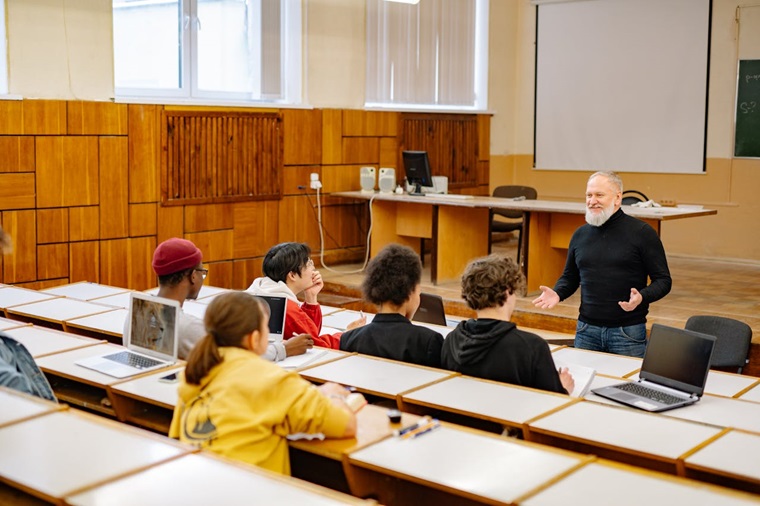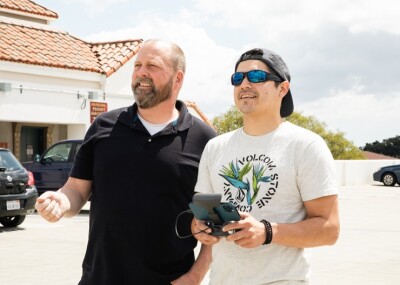As the drone industry grows, so does the demand for qualified, experienced, and educated drone professionals.
Fortunately, colleges and universities are adding more courses and programs to teach the next generation of uncrewed systems employees. Across the US, schools are taking steps to help students prepare for careers in the drone industry by providing everything from Part 107 test training to specialized coursework on drones in agriculture, data collection with UAVs, drone maintenance, and more.
University Roundtable at Commercial UAV Expo 2024
Evidence of this increased academic focus on the uncrewed world could be found at the University Roundtable session at this year’s Commercial UAV Expo. At this event, some 40 teachers, administrators, and students came together to discuss their programs, their goals, and the challenges of serving students seeking careers in our growing and changing industry. The roundtable was moderated by Jay Seidel, the director of the Fullerton Drone Lab at Fullerton College.
Commercial UAV News Staff Writer Carla Lauter described the event as a valuable opportunity for educators and students to make connections and hear about novel approaches to courses and programs. Speaking on the Commercial UAV News Uncrewed Views podcast, Carla said, “I heard a lot of great conversations about the opportunities that they’re providing their students.”
She said the event gave people ability to “network and make connections with people in similar roles,” and she strongly encouraged anyone involved in drone education to make plans to attend next year’s Commercial UAV Expo to take advantage of his unique professional opportunity.
New Programs and Courses
At the same time leaders in drone education are taking part in events like the University Roundtable, they are also adding and expanding their drone-focused offers as they seek to meet the demands of students and industry. Here’s a look at some of the new college drone programs that have started up around the US in recent months.
Recently, the FAA selected the University of Texas at Arlington (UTA) to offer a “Drones and Advanced Construction Technology” course. Part of the agency’s Unmanned Aircraft Systems Collegiate Training Initiative, the course is aimed at helping civil and architectural engineers earn their commercial drone pilot license. Coursework will address the requirements for passing the FAA’s Part 107–Initial Aeronautical Knowledge Exam. UTA will also require students to complete a minimum of 15 hours of flying time, which will earn them a Construction Drone Professional certificate.
A “practical, hands-on approach” to drone education is offered at Utah State University Eastern. According to the school, students “aren't just learning to fly drones; they’re also building, designing, crashing and repairing them.” USU Eastern provides a Drone Certification program that helps would-be pilots earn their commercial license, as well as a “Drones for Hire” class that puts students in drone-focused internships. Recent students have taken advantage of internship opportunities in fields such as agriculture, mosquito abatement, search and rescue, and construction.
A Wallace Community College, located in Dothan, Alabama, both college-level and high school students can take a specialized drone training course. Offered through the school’s Criminal Justice program, the one-semester credit program focuses on training for the FAA’s Drone Pilot Licensure exam. Wallace Community College also offers a non-credit program, to enable working professionals to obtain a drone pilot license without academic credit.
High school students can also receive drone training at Victoria College in Texas. Building on a program that launched last year, the school is offering 9-12 grade students with high scores in math and science coursework to take part in its two-week Drone Pilot Academy. The Academy, which is supported by a Governor’s Summer Merit Program grant, features instruction on safe and legal drone operations through classroom instruction, hands-on flying sessions, and other presentations.
Maryland’s Chesapeake College recently announced its new UAS (Drone) FAA Remote Pilot” course. Like other colleges, the school launched its program to prepare students to pass the FAA’s Part 107 certification exam. However, students can also take part in the Licensure Prep for Home Inspector Certification course and earn an FAA TRUST recreational certificate. Chesapeake’s course has received program approval from the FAA’s Unmanned Aircraft Systems-Collegiate Training Initiative (UAS-CTI).
At the University of Nebraska at Omaha (UNO), a new drone-focused technology education and research initiative has been created to focus on mitigating wind hazards such as tornadoes and high wind hazards in tribal areas. With funding from a $75,000 grant from the National Science Foundation (NSF), a team comprised of researchers from UNO and the University of Nebraska-Lincoln (UNL) and experts in digital governance, tribal management, GIS, meteorology, and artificial intelligence will focus on finding ways to improve disaster resilience in tribal communities, such as the Omaha Tribe in Macy, Nebraska. According to UNO, the initiative is “part of UNO's Unmanned Aerial Systems (UAS) program, launched in 2017 by the Aviation Institute, preparing students for a future where drones play a key role in various industries, from agriculture to public safety.”
Watch Commercial UAV News for regular updates on drone education and training.















Comments